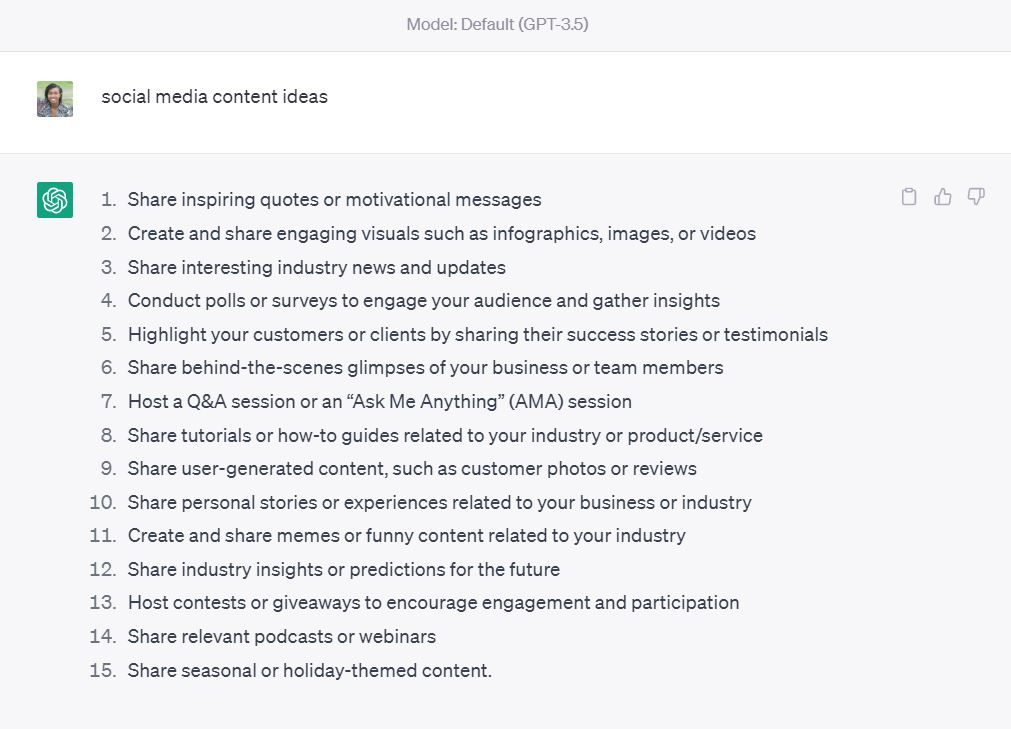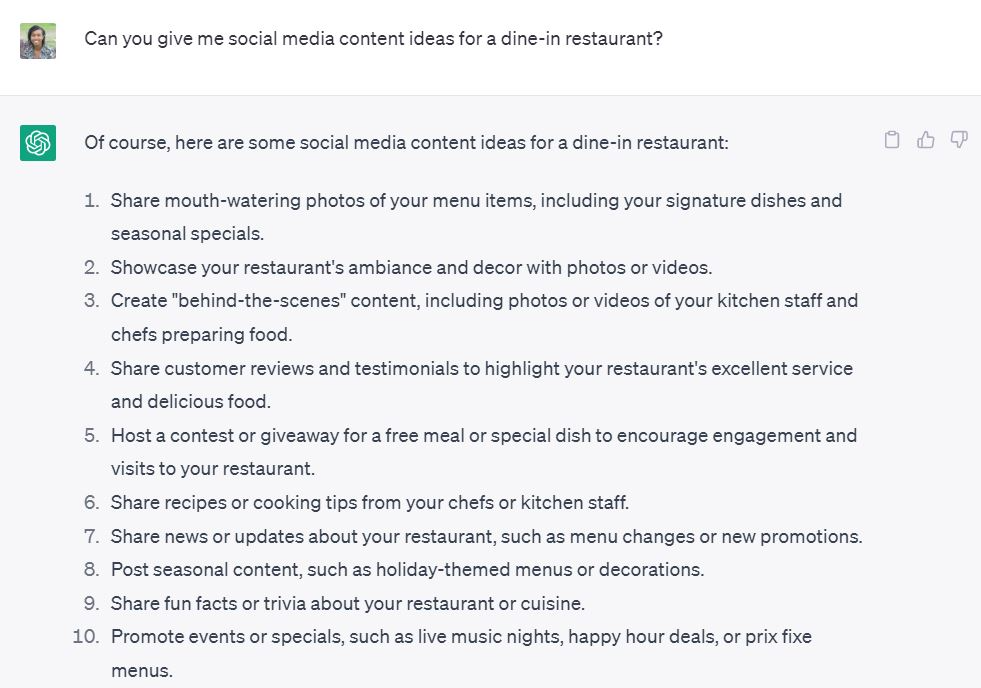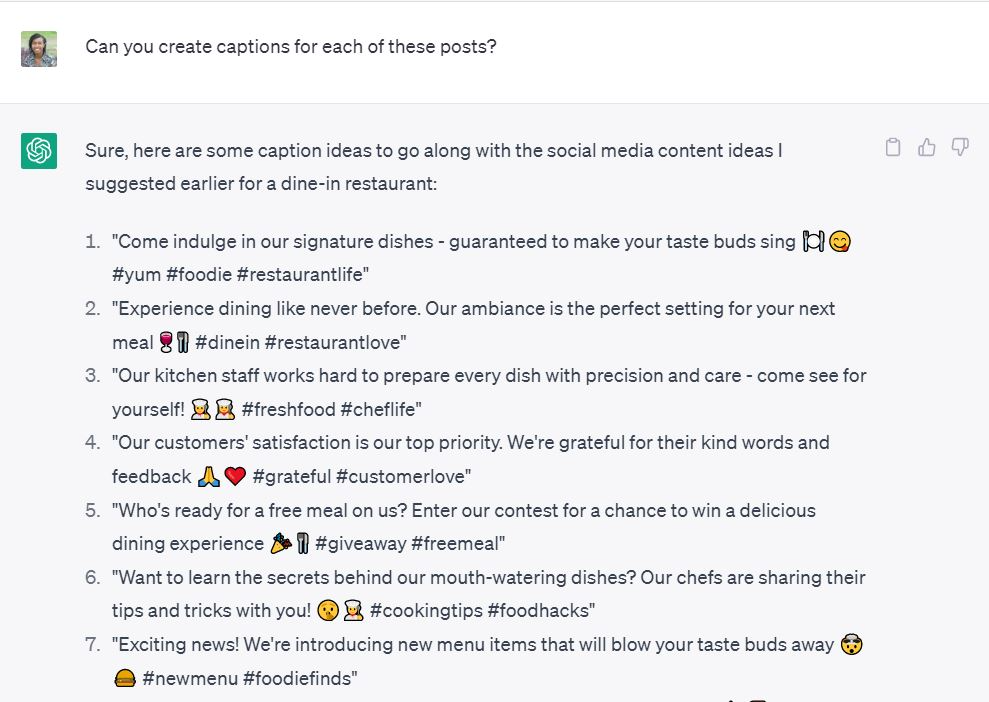Table of contents
As a business owner, you’re always looking for the best ways to grow and improve your business. Saving time on repetitive activities and reducing recurring costs are among the most effective ways to foster growth. Enter ChatGPT, the AI tool that everyone’s talking about. Businesses large and small are exploring ways to use the tool in critical business areas, from marketing to customer service.
Is ChatGPT just another shiny tech tool or an important tool you should seriously consider for your business? Here’s all you need to know about ChatGPT, ways to use it for business, and the important limitations to consider.
What is ChatGPT?
ChatGPT is an AI-powered chat tool developed by OpenAI, an artificial intelligence laboratory. It can understand and process spoken and written human language and generate human-like responses based on user prompts.
ChatGPT is based on OpenAI’s GPT architecture. GPT stands for Generative Pre-trained Transformer, a type of neural network that can generate natural language text. A neural network is an algorithm that processes and analyzes information in a pattern similar to the human brain. It is trained on large amounts of data from different sources. The network learns the patterns and relationships in the training data and then uses the knowledge to make predictions and generate new data.
ChatGPT was pre-trained on text from the internet, including books, web pages, and articles. When you enter a text prompt in ChatGPT, the model generates a response that is coherent, grammatically correct, and non-plagiarized based on the information provided. This is because the model can recognize and understand patterns and relationships in a language, then predict words and sentences that should come next in a sentence.
How is ChatGPT different from search engines?
Search engines rely on robots to crawl web pages and rank them in order of relevance based on an algorithm. For example, If you search for “social media content ideas,” search bots crawl the web, find web pages with content related to the provided keyword and display the most relevant results. It’s then up to you, the searcher, to visit those websites individually and find the information you need.
With ChatGPT, you don’t conduct searches. Instead, you have conversations with the tool using text prompts. While you could type “social media content ideas” as a prompt, you’d get far more interesting responses if you framed the prompt as a dialogue.
For example, here’s the result ChatGPT provides with the prompt “social media content ideas.”

Since there’s no context to the prompt, it simply lists ideas.
When given additional information, such as the type of business, it provides more tailored ideas.
Here, the new prompt is, “Can you give me social media content ideas for a dine-in restaurant?”

It can also generate captions for the ideas it already suggested.
Here, the prompt is “Can you create captions for each of these posts?”

In the last prompt, ChatGPT understood that the user was referring to the previously generated posts in the context of the current dialogue and responded accordingly.
How to use ChatGPT for business
If you’re still wondering if you can use ChatGPT for your business, the short answer is yes. ChatGPT can help you save time, improve customer service, and streamline your workflow. You can use ChatGPT as a stand-alone tool or integrate it with other tools, like your customer service software or learning management system, to access more advanced capabilities.
Here are real-life use cases and ideas on how to use ChatGPT in your business.
1. Marketing and content creation
For many business owners, content creation is currently the strongest use case for ChatGPT. For example, you can use ChatGPT to generate social media content and draft emails, articles, blog posts, product descriptions, and ads.
It’s a highly effective tool for overcoming writer’s block and moving quickly beyond the “blank canvas” stage. Once the tool has generated a first draft, you can tweak the output to match your brand’s voice. You can even ask ChatGPT to write in a specific tone or voice.
Here are some real-life examples of ChatGPT applications in marketing and content creation:
- Canva, the popular graphic design tool, has implemented features that leverage ChatGPT’s abilities. Users can use the Magic Write tool to generate social media captions, profile bios, and more. ChatGPT can also generate image suggestions for social media posts, and you can plug those suggestions into Canva’s AI image generator and find the right image for your design.
- Taboola, the native advertising platform, is currently experimenting with ChatGPT for its ad platform. The integration will allow advertisers to generate highly optimized ad titles and captions.
- PR Firm Wunderlich Kaplan is using ChatGPT to draft press releases and customer bios faster and more affordably.
- Real estate firms are using ChatGPT to draft home listing descriptions and agreements and to analyze real estate deals.
- HR professionals use ChatGPT to generate descriptive job postings that accurately reflect role requirements and include the right keywords.
2. Customer service
This application is particularly attractive for large businesses that get a lot of customer support queries and want to speed up their customer service process.
Here are some use cases:
- Answering customer questions in chatbots: ChatGPT can generate automated responses to repetitive customer queries. This way, customers can find the information they need quickly without waiting for agents.
- Providing personalized product recommendations: For example, Shopify uses ChatGPT-powered chatbots to suggest products and offer discounts based on user preferences.
- Monitoring the quality of customer service conversations: ChatGPT is great at sentiment analysis, that is, analyzing text to determine the emotional tone of a message. For businesses that receive large volumes of customer service requests, employing ChatGPT can help detect the conversations that need immediate attention.
An important thing to note is that to use ChatGPT for customer support, it has to be trained on customer service interaction data and then integrated into external customer service tools or software. This means small businesses may need to use other tools to leverage ChatGPT for customer service.
3. Research
Research is often a time-consuming but crucial business activity. Since ChatGPT is trained on copious amounts of internet data, it is knowledgeable about many topics and can simplify your research process.
One powerful way to use ChatGPT for research is by asking it to pose as an expert in a specific field. For example, you could ask ChatGPT to assume the role of a business consultant and then ask questions as a business owner. While the responses are not always accurate, they can be a great place to start your research process.
ChatGPT can also be used to brainstorm ideas, categorize information, and generate task lists. Another interesting use case is for creating quick summaries. For example, Salesforce and OpenAI have introduced a ChatGPT app for Slack integration. The integration will allow users to get instant conversation summaries in channels or threads to catch up on discussions.
Limitations of ChatGPT
While ChatGPT is a powerful tool with many useful applications, it has real limitations that you should consider when using it for business.
- It may provide inaccurate or false answers. ChatGPT often provides plausible-sounding but completely inaccurate answers. Since the responses are conversational, it’s much harder for someone with little experience or knowledge in the domain to detect wrong or misleading answers.
- It cannot search the web. While plugins and integrations may enable this functionality, ChatGPT is currently unable to search the web or visit specific URLs. In addition, the information it provides about facts, people, and events is accurate up to September 2021, which is the cutoff date for its training data.
- The prompt determines the answers. ChatGPT’s response is only as good as the prompt. If you enter a confusing or ambiguous prompt, the response will likely be no different. You may also get entirely different answers with the same prompt.
When not to use ChatGPT
- Making high-stakes decisions: ChatGPT may not be the right choice for making decisions where the potential consequences are significant. While it can serve as a starting point for research, it would be unwise to make final business decisions based solely on its output. Always seek the opinion of an expert with specialized knowledge of your business.
- Handling sensitive information: As AI tools like ChatGPT become more powerful, privacy remains a major concern, especially regarding training data. Sharing sensitive information with ChatGPT may violate data protection and privacy laws.
Best practices for implementing ChatGPT in your business
- Create an acceptable use policy for AI-generated content. Define acceptable and unacceptable use cases for ChatGPT in your business, especially if your employees use the tool for business activities. For example, you may consider using ChatGPT for generating social media content but rule against it for writing complete blog posts and articles.
- Break down complex tasks into smaller ones. You are more likely to get concise responses from ChatGPT if you simplify complex queries into more manageable prompts.
- Always review the output. Since ChatGPT may not always produce accurate or ethical responses, it’s important to implement human oversight.
Finding ways to leverage ChatGPT in your business is undoubtedly a smart move. Your business can tap into ChatGPT’s abilities to save time on repetitive, low-level tasks so you can focus on more important areas of your business. It’s important to set clear policies regarding acceptable usage and ensure that all AI-generated output is carefully reviewed by a human before use.
![]()











